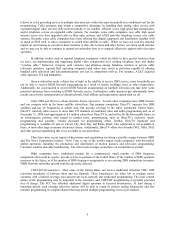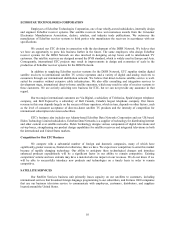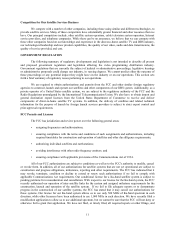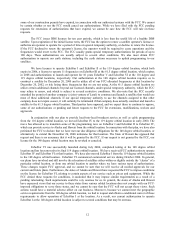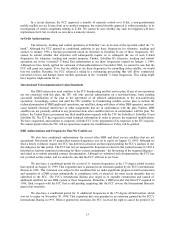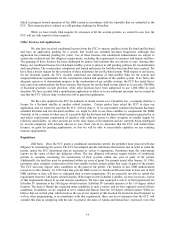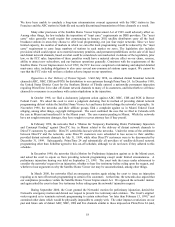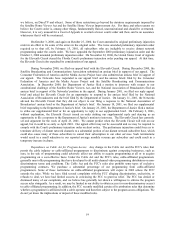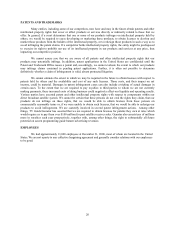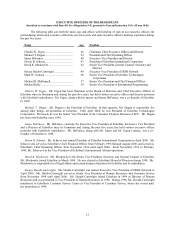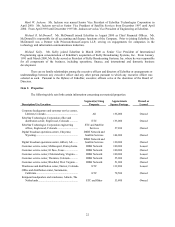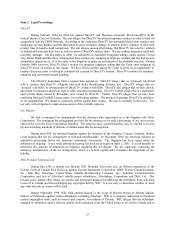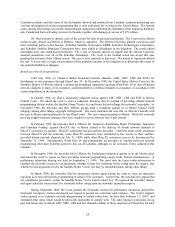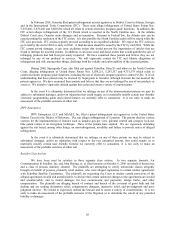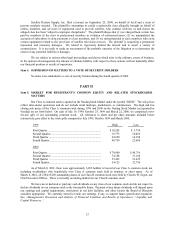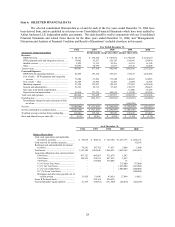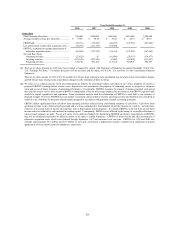Dish Network 2000 Annual Report Download - page 21
Download and view the complete annual report
Please find page 21 of the 2000 Dish Network annual report below. You can navigate through the pages in the report by either clicking on the pages listed below, or by using the keyword search tool below to find specific information within the annual report.19
we believe, on DirecTV and others). Some of those restrictions go beyond the statutory requirements imposed by
the Satellite Home Viewer Act and the Satellite Home Viewer Improvement Act. For these and other reasons we
believe the Court’s order is, among other things, fundamentally flawed, unconstitutional and should be overturned.
However, it is very unusual for a Court of Appeals to overturn a lower court’s order and there can be no assurance
whatsoever that it will be overturned.
On October 3, 2000, and again on October 25, 2000, the Court amended its original preliminary injunction
order in an effort to fix some of the errors in the original order. The twice amended preliminary injunction order
required us to shut off, by February 15, 2001, all subscribers who are ineligible to receive distant network
programming under the court’s order. We have appealed the September 2000 preliminary injunction order and the
October 3, 2000 amended preliminary injunction order. On November 22, 2000, the United States Court of Appeals
for the Eleventh Circuit stayed the Florida Court’s preliminary injunction order pending our appeal. At that time,
the Eleventh Circuit also expedited its consideration of our appeal.
During November 2000, we filed our appeal brief with the Eleventh Circuit. During December 2000, the
Satellite Broadcasting and Communications Association submitted an amicus brief in support of our appeal. The
Consumer Federation of America and the Media Access Project have also submitted an amicus brief in support of
our appeal. The Networks have responded to our appeal brief and the amicus briefs filed by the Consumer
Federation of America and the Media Access Project and the Satellite Broadcasting and Communications
Association. In December 2000, the Department of Justice filed a motion to intervene with respect to our
constitutional challenge of the Satellite Home Viewers Act, and the National Association of Broadcasters filed an
amicus brief in support of the Networks’ position in the appeal. During January 2001, we filed our reply appeal
brief and asked the Eleventh Circuit for an opportunity to respond to the amicus brief filed by the National
Association of Broadcasters and the brief filed by the Department of Justice. On January 11, 2001, the Networks
advised the Eleventh Circuit that they did not object to our filing a response to the National Association of
Broadcasters’ amicus brief or the Department of Justice’s brief. On January 19, 2001, we filed our supplemental
brief responding to the Department of Justice’s brief. On January 23, 2001, the Department of Justice filed a motion
to strike our supplemental brief or for an opportunity to reply to our supplemental brief. On February 2, 2001,
without explanation, the Eleventh Circuit issued an order striking our supplemental reply and denying us an
opportunity to file a response to the Department of Justice’s motion to intervene. The Eleventh Circuit has currently
set oral argument for the week of April 23, 2001. We cannot predict when the Eleventh Circuit will rule on our
appeal, but it could be as early as April 2001. Our appeal effort may not be successful and we may be required to
comply with the Court’s preliminary injunction order on short notice. The preliminary injunction could force us to
terminate delivery of distant network channels to a substantial portion of our distant network subscriber base, which
could also cause many of these subscribers to cancel their subscription to our other services. Such terminations
would result in a small reduction in our reported average monthly revenue per subscriber and could result in a
temporary increase in churn.
Dependence on Cable Act for Program Access. Any change in the Cable Act and the FCC’s rules that
permit the cable industry or cable-affiliated programmers to discriminate against competing businesses, such as
ours, in the sale of programming could adversely affect our ability to acquire programming at all or to acquire
programming on a cost-effective basis. Under the Cable Act and the FCC’s rules, cable-affiliated programmers
generally must offer programming they have developed to all multi-channel video programming distributors on non-
discriminatory terms and conditions. The Cable Act and the FCC’s rules also prohibit some types of exclusive
programming contracts. We purchase a substantial percentage of our programming from cable-affiliated
programmers. Some of these restrictions on cable-affiliated programmers will expire in 2002 unless the FCC
extends the rules. While we have filed several complaints with the FCC alleging discrimination, exclusivity, or
refusals to deal, we have had limited success in convincing the FCC to grant us relief. The FCC has denied or
dismissed many of our complaints, and we believe has generally not shown a willingness to enforce the program
access rules stringently. As a result, we may be limited in our ability to obtain access (or non-discriminatory access)
to cable-affiliated programming. In addition, the FCC recently modified certain of its attribution rules that determine
whether a programmer is affiliated with a cable operator and therefore subject to the program access obligations. We
do not yet know the implications or impact of these modified rules.


